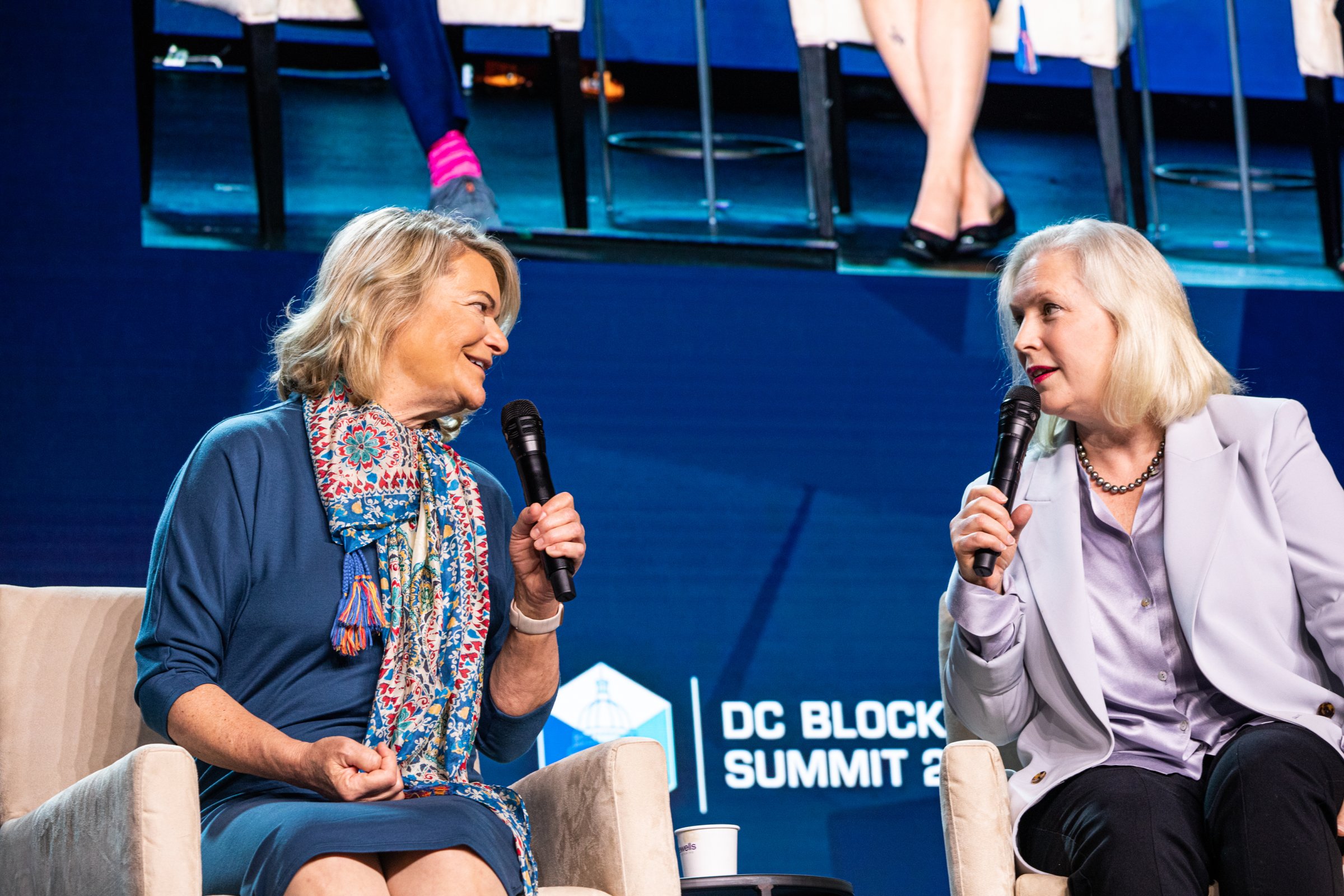
While the crypto industry has taken a huge downturn over the last month, you wouldn’t necessarily know it from the optimism in DC. On Tuesday, some of the nation’s top lawmakers, regulators and crypto lobbyists convened in downtown Washington for the annual DC Blockchain Summit, which has existed since 2016. Speakers compared the rise of crypto to that of the internet, the iPhone, and even the airplane, with Senator Cory Booker joking that if today’s regulators presided over the 1900s, “Orville and Wilbur Wright would have never gotten off the ground.”
The summit, which was attended by over 800 people, proved that there are many crypto supporters on the Hill, and that formal processes are underway to grow and normalize the industry. Here are some of the main takeaways from the summit.
A bill from two prominent senators aims to increase crypto adoption.
Kirsten Gillibrand and Cynthia Lummis make an unlikely pair: the progressive New Yorker and the Wyoming conservative. But on Wednesday, they joined forces to talk about a crypto bill they are spearheading together, called the Responsible Financial Innovation Act.
The bill largely aims to hand jurisdiction of crypto to the Commodity and Futures Trading Commission (CFTC), which has traditionally been more favorable toward crypto—as opposed to the U.S. Securities and Exchange Commission (SEC). At the moment, the two agencies are jostling for control over crypto’s regulation, along with a slew of other governing bodies. Lummis said the bill’s goal is to “take a light regulatory touch.” “We don’t want to over-regulate because innovation is ahead of us even as we speak,” she said onstage.
Gillibrand pledged to release the bill next month, and says she hopes that it will come to a vote either at the end of this congress or next year. “I’m very optimistic,” she said. Lummis called the collaboration an “open and happy and positive process… this subject is not partisan.”
Other congresspeople are also riding for crypto.
The two other senators who showed up in person were Steve Daines (a Republican from Montana) and Cory Booker (a New Jersey Democrat). When Booker took the stage, he first paused to recognize the toll of the shooting in Texas. In his remarks about crypto, he said he hoped crypto would provide a pathway to financial inclusion for marginalized communities. “People of color look at big financial institutions for what their history shows them to be: discriminating against vulnerable communities,” he said. “It’s no surprise the African Americans and Latinos are turning to a world that is a decentralized world, that they hope will be a more level playing field.”
Representatives Tom Emmer, Darren Soto and Stephen Lynch also appeared via recorded videos to cheer on the conference and pledge that they would fight for crypto’s national adoption. Soto said that blockchain could “help solve some of the most complex problems facing the United States.” Meanwhile, there’s plenty of activity on the Hill around crypto: Christy Goldsmith Romero, a CFTC commissioner, said there were 42 bills currently being worked on in congress that impacted digital assets in some way.
But one regulator pushed back.
There was one notable exception to the prevailing optimism at the summit: Michael Hsu, acting director of the Office of the Comptroller of the Currency, which regulates national banks and could play a role in the future regulation of stablecoins. In a short statement onstage, he lambasted the “hype” driving crypto and pointed to “deep vulnerabilities” in the system. Hsu pointed to the recent hacks of bridges between blockchains; the contagion risks shown by the impact of UST’s collapse on the larger market; and the lack of clarity around digital ownership.
“The industry has grown too fast and suffers from a hype-based, ‘shoot, ready, aim’ approach to innovation and value creation,” he said. “The OCC will continue to take a careful and cautious approach to crypto in order to ensure that the national banking system is safe, sound, and fair.”
Read more: The Real Reasons Behind the Crypto Crash, and What We Can Learn from Terra’s Fall
An internal battle is brewing at the SEC.
One of the main targets at the summit was SEC Commissioner Gary Gensler, who has spoken critically of crypto over the last few years. Perianne Boring, the founder and president of the Chamber of Digital Commerce, which hosted the summit, called the SEC “number-one blocker to this industry” onstage. Joining her in this criticism was SEC commissioner Hester Peirce, who is far friendlier to crypto than Gensler. (Peirce, a Trump appointee, predates Gensler, a Biden appointee, at the SEC).
At a panel about regulation and innovation, Peirce spoke out against what she felt to be the SEC’s heavy-handed tactics against crypto. “We’re taking an enforcement-first approach where we should be taking a regulatory-first approach. I think we’ve got the balance wrong right now,” she said.
It may take years before comprehensive legislation on crypto is passed.
While enthusiasm was high at the summit, the multitude of opinions, governing bodies and semi-conflicting efforts mean that it could be years before substantial legislation on crypto is passed. Gillibrand said that her and Lummis’s bill will have to go through oversight hearings on four different committees, each of which has a long agenda to get through. And while President Biden released an executive order on digital assets in March, the order won’t produce direct legislation, but more than a dozen reports on crypto’s potential benefits and dangers.
“We don’t expect significant policy changes this year,” Boring said onstage. “This will be a multi-year process.”
More Must-Reads from TIME
- Cybersecurity Experts Are Sounding the Alarm on DOGE
- Meet the 2025 Women of the Year
- The Harsh Truth About Disability Inclusion
- Why Do More Young Adults Have Cancer?
- Colman Domingo Leads With Radical Love
- How to Get Better at Doing Things Alone
- Michelle Zauner Stares Down the Darkness
Contact us at letters@time.com